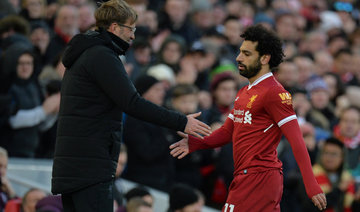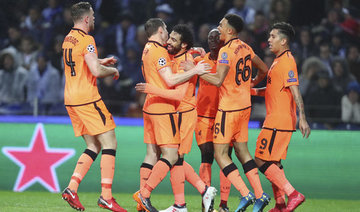BASYOUN, Egypt: In front of the Arab Contractors Club in Jabal Al-Asfar, east of Cairo, I embarked on a journey to Najrij, the hometown of Liverpool and Egypt star Mohamed Salah.
It is an arduous trip, one that the 25-year-old used to make every day, but one that reveals a lot about the drive and determination that have made Salah one of the best footballers in the world.
THE JOURNEY BEGINS
The journey started near the El-Mokawloon Club, where I boarded a minibus that took me to Ramses Square in the center of Cairo. It did not take long for the bus to become packed. Having broken free from Cairo’s notoriously crowded streets, we traveled 100 kilometers on bumpy roads to El-Maarad station in Tanta, a two-hour journey. Two hours, and another two taxi journeys later, I finally reached Salah’s hometown.
While neighboring villages had gates and signs displaying their names, Najrij had neither, and it was not until I asked the taxi driver that I was actually able to find my destination.
Najrij’s main street is a paved road that runs through alfalfa and wheat fields before reaching the village center. After walking for about 500 meters, I finally arrived at the street on which Salah and his family lived.
The four-hour journey from El-Mokawloon Club to his house was long and exhausting. But while I made the trip just once, it is a journey a young Salah took every day — back and forth — just so he could stay with his family and be with the people most important in his life.
WHERE IT ALL BEGAN
There was nothing exceptional about Salah’s three-story house. Similar to others around it, its exterior façade was unpainted, except for the balconies. The iron gate was closed, as was the garage.
Salah’s neighbors are used to seeing the world’s press descend on their street in search of where the star grew up. These streets were the arena where he played with friends, learning and honing his exceptional talent, scoring thousands of goals, before gaining experience playing alongside the footballers of the local Amateur Youth Center.
The Egyptian football star’s instructions to his family members are strict: “Do not speak to the media at all.”
According to sources close to his family, Salah feared that they would be chased and annoyed by the press delving into their personal lives. This move was praised by some, who felt he was simply making sure his private life was respected, while others criticized him, saying that people had a right to know details of the Egyptian star’s life.
But due to the silence little is known about what makes Salah tick and the foundations of what is fast becoming an exceptional career.

CHARITY BEGINS AT HOME
Walking around Najrij’s narrow streets and alleys, you would not guess that this was where one of the world’s best players grew up. There was not a single picture of the country’s favorite son on display, either on his house or anywhere else.
But while his face his absent from Najrij, his sense of civic duty and kindness is clearly evident. Across the village it was easy to find projects created and funded by Salah. There was the Azhari Institute for Girls, being built at a cost of 8 million Egyptian pounds ($450,000), according to the village’s mayor, Maher Shatiya. Salah has also helped build an outlet to sell National Service Projects Organization products in the village, as well as a building for ambulance services.
Walking through the village, it was not long before I stumbled across a store for school supplies owned by Hajj Mohammed El-Bahnasi. The 60-year-old used the small shop as a temporary head office for the Salah Foundation, which he managed in cooperation with a board of trustees that included Salah’s father, uncle and brother.
El-Bahnasi, like the rest of Najrij, is used to being hosted by local and foreign media. After selling drawing pads to two young girls, he straightened his back and said in a calm tone: “I don’t know why the media is so concerned with the details of the foundation’s work. This is charity work and must be kept secret so that it gets rewarded by God.”
I asked him to speak about the foundation in general — as he wished.
“Captain Mohamed suggested starting this foundation after spending a few days in the village last Ramadan and noticing how people in need went and knocked on the door of his family’s house. He and his father responded to several requests they received, but he decided there and then it would be better to organize this work and ensure help reached those who deserved it.
“We have identified those in need in our village first because we are aware of their circumstances.”
Today, about 400 families in the village, including widows, orphans, and those who are ill, receive assistance. On top of that the foundation finances a few marriages and helps Syrian refugees in the Gharbia Governorate, where the village is located.
El-Bahnasi believes “Salah’s success with Liverpool is a result of his proximity to God and his humanitarian and moral commitment, as well as the prayers of millions of loyal Egyptians.”
GLOBAL SUPERSTAR
El-Bahnasi’s son, Mahmoud, is a close friend of Salah’s; they speak regularly and discuss the Egyptian star’s performances in the Premier League and Champions League.
Of the new anthem sung by Liverpool fans, in which they chant: “If he’s good enough for you, he’s good enough for me. If he scores another few, then I’ll be Muslim, too,” El-Bahnasi said: “Every day after I perform Salat Al-Fajr, I surf social networking and news websites. One day and by coincidence, I read the news about the anthem the fans created for our son, Mohamed Salah, and I immediately broke into tears because Mohamed the Muslim still holds on to the morals of Najrij and everyone respects him and loves what he does — like prostrating in the pitch after scoring goals.
“Mohammed taught the Europeans that Islam encourages sincerity and diligence in everything we do. His success was not a coincidence because success requires hard work.”

THE MAYOR’S MEMORIES
Close to El-Bahnasi’s house is the home of Najrij’s mayor, Maher Shatiya. He was waiting for me on the balcony of his house, overlooking the street.
After Salah stopped his family speaking to the media, Shatiya, together with a few other villagers, took responsibility for speaking to journalists and answering their questions.
Sitting back and speaking in a tone that exuded both pride and enthusiasm, Shatiya said: “Mohamed was a very ordinary child — like all the other children in this village. He inherited his love for playing football from his father and uncles, who played with the village’s Amateur Youth Center’s team during the 1980s and 1990s.
“Salah’s father noticed his son’s talent and had him join the Ittihad Basyoun team when he was 12 years old.
“One day, Reda El-Mallah, a football scout, came to our village to watch another child named Sherif and possibly persuade him to join one of El-Mokawloon’s small teams in Tanta.
“He asked the children to play against Sherif so he could assess him. But watching the match there was one player who stood out — Mohamed Salah. So he asked him to play with El-Mokawloon in Tanta. From there Salah went on to play with the club’s youth team in Cairo, then for their first-team in the Premier League.
“It was then he began to make a name for himself across Egypt and it wasn’t long before European teams showed an interest.”
Salah’s first foray into European club football was with Swiss side Basel, where he moved in 2012. While at the Swiss giants he caught the eye of Chelsea and moved to Stamford Bridge two years later. Later success with Roma persuaded Liverpool to part with as much as £38 million ($52 million) and since his move to Anfield he has been setting the footballing world alight.
HOMEBOY AT HEART
Shatiya told me a story about Salah’s wedding that illustrates his love and attachment to Najrij.
“Salah’s henna party (a party thrown on the day before the wedding day) was held here,” he said. “And even though his wedding was in Cairo, he spent his honeymoon in the village.”
He added: “Salah walks around the village like any other young man. He knocks on the neighbors’ doors to say hello to them during occasions.
“He also renewed the tradition of visiting families during Eid and visited me when he was in the village last Ramadan after I was injured in a car accident.”

Mohamed Salah greets a neighbor on one of his many trips home. (Asharq Al-Awsat)
As if to illustrate the love the village has for Salah and the awe he inspires in children, three cafes were opened in Najrij after Salah become famous, just to accommodate all the football-mad children who are always keen to watch all his games.
“Our greatest wish was to see Salah play in the Egyptian Premier League, but he exceeded all expectations and played with the world’s greatest clubs and became the best footballer in Africa.”
HUMBLE HERO
I left the mayor’s house and headed to the Azhari Institute for Girls, which is still under construction, with Hassan Bakr, a social researcher at the Salah Foundation. When we headed toward the village’s youth center, which was renamed “Mohamed Salah’s Youth Center,” I asked my companion what he liked most about Salah, and his response was: “His humbleness.”
The center has a football pitch, and the main building was decorated with a big sign featuring Salah’s name. We saw a few children practicing karate inside one of the halls.
I bid Bakr farewell and left, returning to Cairo by the same route — another trip that lasted four exhausting hours. But while making my way back to the capital, I remembered this was the exact journey the Egyptian star would take every day and, despite the hardship, it only made him more determined to succeed and achieve his dream.




























